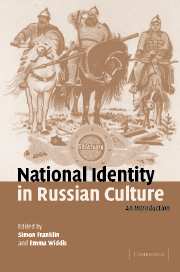Book contents
- Frontmatter
- Contents
- List of illustrations
- Notes on contributors
- Preface
- Note on the transliteration of Russian
- Map: The growth and contraction of Russia and its empire
- 1 ‘All the Russias …’?
- SECTION I IDENTITIES IN TIME AND SPACE
- SECTION II CONTRASTIVE IDENTITIES: ‘US’ AND ‘THEM’
- SECTION III ‘ESSENTIAL’ IDENTITIES
- 6 Identity and religion
- 7 Music of the soul?
- 8 Identity in language?
- 9 Byt: identity and everyday life
- SECTION IV SYMBOLS OF IDENTITY
- Afterword
- Notes
- Selected further reading in English
- Index
7 - Music of the soul?
Published online by Cambridge University Press: 04 May 2010
- Frontmatter
- Contents
- List of illustrations
- Notes on contributors
- Preface
- Note on the transliteration of Russian
- Map: The growth and contraction of Russia and its empire
- 1 ‘All the Russias …’?
- SECTION I IDENTITIES IN TIME AND SPACE
- SECTION II CONTRASTIVE IDENTITIES: ‘US’ AND ‘THEM’
- SECTION III ‘ESSENTIAL’ IDENTITIES
- 6 Identity and religion
- 7 Music of the soul?
- 8 Identity in language?
- 9 Byt: identity and everyday life
- SECTION IV SYMBOLS OF IDENTITY
- Afterword
- Notes
- Selected further reading in English
- Index
Summary
Towards the end of 2000, a great controversy developed over the new Russian national anthem – notover the words, which were not yet settled, but over the music. Not only was Russia stirred up, but the news media all over the world picked up on the story and a rash of new websites appearedin many different host countries, all devoted to the Russian national anthem issue. What was the cause of this storm over a meretune? There were many accounts in Russia. According to one popular narrative, it all began with the unexpectedly poor showing of the Russian football team in the 1998 World Cup. Many remarked on the sight of the sullen-faced players as they stood in line while their anthem was played before the match. The players later complained that the post-Soviet anthem introduced under President Eltsin, an unfamiliar melody with no wordsattached, could never inspire them to the great patriotic effortneeded for success in such an enterprise. Beside all the other competing nations, they were unduly handicapped.
Their complaint did not pass unheard in the Kremlin, and President Putin realized that bold and decisive action was called for: the Eltsin national anthem must be ditched, and the old familiar melody of the Soviet anthem restored. Nothing less would suffice. Exactly how much, if any, of the old Soviet lyric was to be retained could be settled later, but the main thing was to bring back the old tune, a tune that would recall the proud and mighty Russia that existed before the chaos and humiliations of the 1990s destroyed the nation's confidence.
- Type
- Chapter
- Information
- National Identity in Russian CultureAn Introduction, pp. 116 - 131Publisher: Cambridge University PressPrint publication year: 2004

